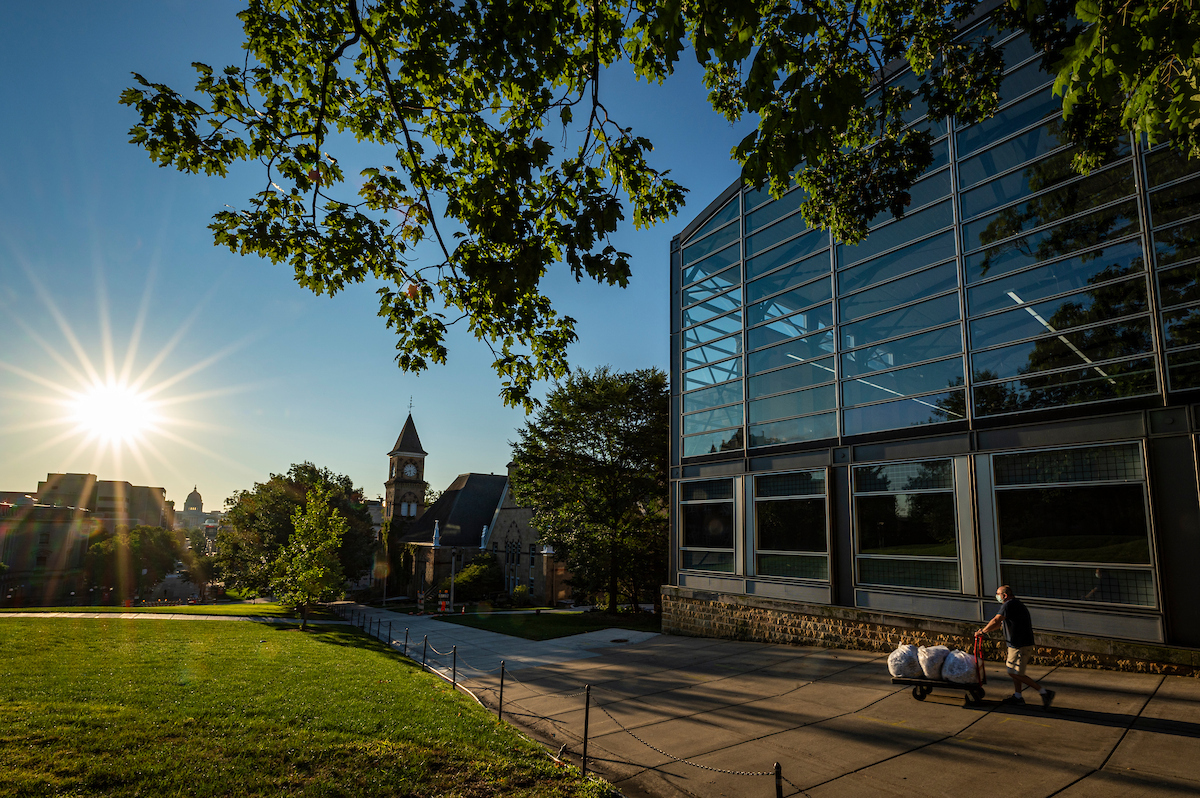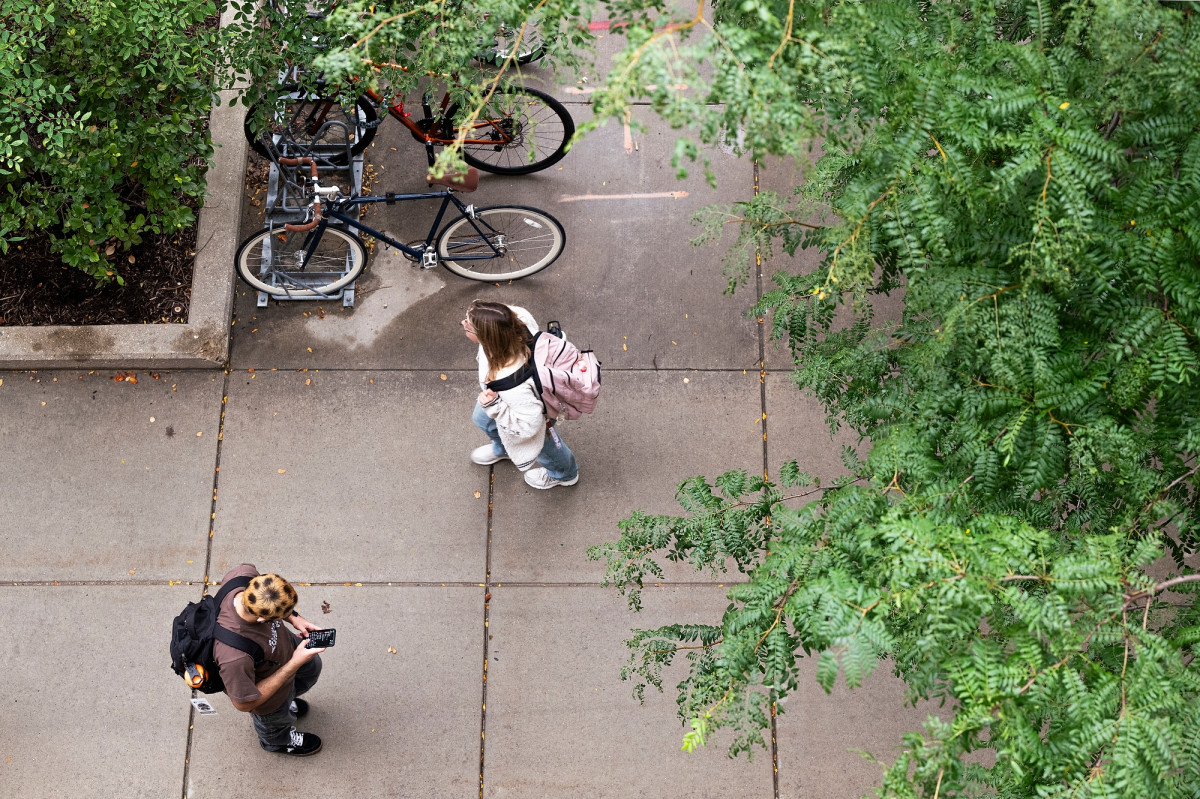Student to student: Are you better at early or late classes?

Some students struggle with their 7:45 a.m. classes, crawling out of bed at 7:30 a.m., throwing on a jacket and rushing through a quiet campus to arrive in time.
But plenty of others prefer the early class. Why deal with having to miss activities in the afternoon and evening, or crucial catchup time, when students can just plan their class schedules to finish after the morning?
Cross-College Advising Service Peer Advisor Mia Braico argued that morning classes can be engaging and fun.
“I’m personally a morning person, so I love me an 8 a.m.,” said Braico. “I had Psych 202 at 8 a.m. my first semester of college, and my friend and I would always get coffee beforehand. It honestly was one of my favorite classes.”
Whichever student you are, it might take you time to figure out which type of class schedule — early or later — works best for you, both academically and socially. Balancing both is challenging at times, and college students should figure out what works for them so they can succeed down the road.
At UW–Madison, students are encouraged to have a strong academic foundation while also pursuing social aspects of campus life, including joining club organizations, working student jobs and attending UW events. On a campus with almost 37,000 undergraduate students, the options for socialization are many.
Understand your own study needs
Senior Maya Dettwiler, a peer advisor for the College of Letters and Science academic advising, said her preference has changed throughout college. During her sophomore year at UW–Madison, Dettwiler said she would’ve been more willing to take earlier classes.
Now, she said, “I classify myself as an ‘afternoon person’…I feel most productive when my classes are around 11 a.m. so I have the time to wake up my brain and get geared up for the day.”
Dettwiler said this schedule still leaves time for her to finish schoolwork and go to her job.
Try both early and late classes
At UW–Madison, classes range throughout the day, starting as early as 7:45 a.m. While this may seem extra early, it gives course schedulers the necessary time to fit nine classes of 50 minutes and six classes of 75 minutes into each room on campus daily. Students gain the benefit of having more scheduling options.
Cross-College Advising Service Professional Advisor Rae Scifo said, “This is all an experiment, especially early on. If a student has no experience making their own schedule, then trying a few that are earlier and a few that are later could make sense. This way they have the opportunity to note how they feel and their attention in courses at different times of the day to make more informed choices in the future.”
Dettwiler talked about her experience with an 8 a.m. course her junior year of college. “It was a bit of a struggle…it was hard for me to navigate how I can make sure I eat breakfast and get ready for the day while getting to class on time.”

Students that continue to push through these challenges by identifying what time of the day they are the most productive end up having greater academic success.
“There were times that I showed up slightly late, but I made it through the semester,” Dettwiler said.”
Balance academic and social parts of college
School of Journalism and Mass Communications Advisor Sandra Kubat said she often meets with students who are struggling to balance everything. Students that can balance this gain strong personal responsibility that will help them in their future careers.
“It is important to remember that the social aspects are a wonderful part of the college experience,” Kubat said, “[but] they are only one part.”
This doesn’t mean that students who struggle to find this balance aren’t also succeeding or won’t be successful down the road. Kubat said this is the perfect time to rely on available resources.
Her goal, Kubat said, is to talk with students about possible adjustments they can make to their schedules.
“Anything to help the student feel less like they are drinking out of a fire hose, and more like they have a balanced schedule with priorities calibrated,” Kubat said. “Sometimes, it helps to have a third party look at the bigger picture and shine a light when things can seem dark and overwhelming.”
Scifo said she noticed no difference between students who preferred morning classes and those that preferred afternoon classes.
“I think there is a rather pervasive cultural myth that people with a preference for early mornings, whether for school or work, are more organized and hard working. I cannot emphasize enough that this is not true. The biggest factors that I notice for students are their self-knowledge of what time of day they are able to do their best work and the commitments they have outside of class.”
10 tips for a successful semester
Students who are looking to have a successful semester should remember that it’s not only about the time you take your classes, but what you do with that time. Here are ten things you can do to make the most of your education.
- Interact with your professors and TAs often. Personalized guidance can help you become more engaged with the material and learn critical skills.
- Know what type of note-taker you need to be. Does it help to write things down or should you type to keep up with the lecturer? Some students find that typing notes in class and writing them on paper later creates the best retention for them.
- Go easy on the caffeine. Avoid relying too heavily on coffee and energy drinks to get through the day; opt for healthy snacks.
- Rely on your academic advisor: Your advisor is a helpful resource on what’s available at UW–Madison and the benefits and challenges to each path.
- Don’t start skipping class! It may kickstart a semester-ruining habit. Being present in class and engaging with the lecturer leads to higher retention rates.
- Use a mix of studying methods: Switching up the routine is always a great way to learn more about yourself and the best study habits for you. Bring out the flashcards!
- Make a friend in each course: By exchanging information and agreeing to help each other out when needed, you’ll support each other in a low-effort relationship that benefits both of you academically.
- Learn about your learning habits: Are you more productive on days you start earlier or later? If you have a day with no classes in your schedule, do you actually use it to get ahead or does it mess up your productivity?
- Stay in touch with family and friends at home: Relying on your people for advice and support can help keep you grounded. Send voice note updates and invite your friends or family to visit campus.
- Remember this is a semester full of firsts—it’s not going to be perfect: This is the only time you’ll experience this exact semester. It’s going to be fun and new and exciting, and it will also come with challenges, but that’s the point of college and growing up. It’s okay to not know everything right away, but students can be successful by understanding themselves and what they need to succeed—both personally and academically.
Sources: UW–Madison advisors; students




